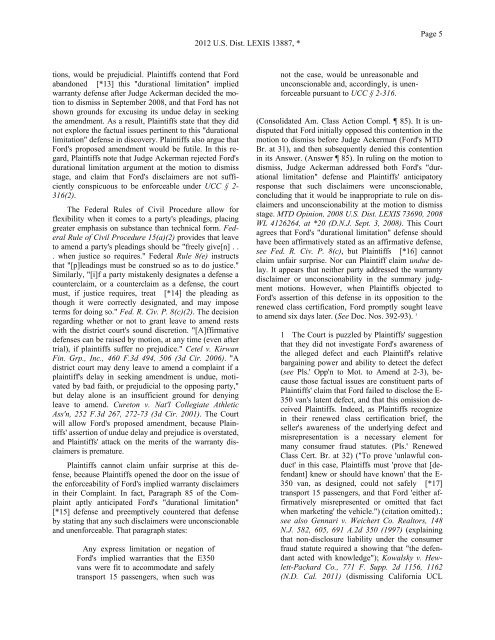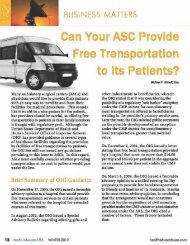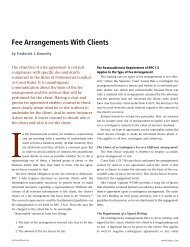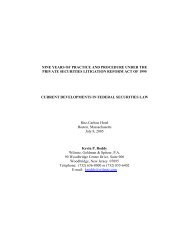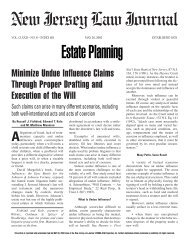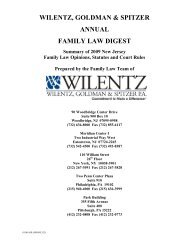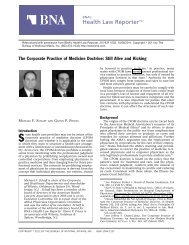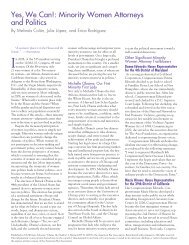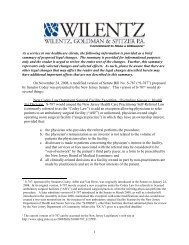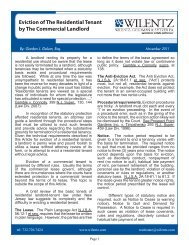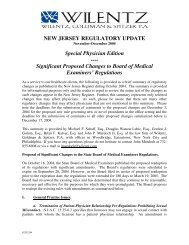In re Ford Motor Co. E-350 Can Products Liability Litigation (No. II)
In re Ford Motor Co. E-350 Can Products Liability Litigation (No. II)
In re Ford Motor Co. E-350 Can Products Liability Litigation (No. II)
You also want an ePaper? Increase the reach of your titles
YUMPU automatically turns print PDFs into web optimized ePapers that Google loves.
2012 U.S. Dist. LEXIS 13887, *Page 5tions, would be p<strong>re</strong>judicial. Plaintiffs contend that <strong>Ford</strong>abandoned [*13] this "durational limitation" impliedwarranty defense after Judge Ackerman decided the motionto dismiss in September 2008, and that <strong>Ford</strong> has notshown grounds for excusing its undue delay in seekingthe amendment. As a <strong>re</strong>sult, Plaintiffs state that they didnot explo<strong>re</strong> the factual issues pertinent to this "durationallimitation" defense in discovery. Plaintiffs also argue that<strong>Ford</strong>'s proposed amendment would be futile. <strong>In</strong> this <strong>re</strong>gard,Plaintiffs note that Judge Ackerman <strong>re</strong>jected <strong>Ford</strong>'sdurational limitation argument at the motion to dismissstage, and claim that <strong>Ford</strong>'s disclaimers a<strong>re</strong> not sufficientlyconspicuous to be enforceable under UCC § 2-316(2).The Federal Rules of Civil Procedu<strong>re</strong> allow forflexibility when it comes to a party's pleadings, placingg<strong>re</strong>ater emphasis on substance than technical form. FederalRule of Civil Procedu<strong>re</strong> 15(a)(2) provides that leaveto amend a party's pleadings should be "f<strong>re</strong>ely give[n] . .. when justice so <strong>re</strong>qui<strong>re</strong>s." Federal Rule 8(e) instructsthat "[p]leadings must be construed so as to do justice."Similarly, "[i]f a party mistakenly designates a defense acounterclaim, or a counterclaim as a defense, the courtmust, if justice <strong>re</strong>qui<strong>re</strong>s, t<strong>re</strong>at [*14] the pleading asthough it we<strong>re</strong> cor<strong>re</strong>ctly designated, and may imposeterms for doing so." Fed. R. Civ. P. 8(c)(2). The decision<strong>re</strong>garding whether or not to grant leave to amend <strong>re</strong>stswith the district court's sound disc<strong>re</strong>tion. "[A]ffirmativedefenses can be raised by motion, at any time (even aftertrial), if plaintiffs suffer no p<strong>re</strong>judice." Cetel v. KirwanFin. Grp., <strong>In</strong>c., 460 F.3d 494, 506 (3d Cir. 2006). "Adistrict court may deny leave to amend a complaint if aplaintiff's delay in seeking amendment is undue, motivatedby bad faith, or p<strong>re</strong>judicial to the opposing party,"but delay alone is an insufficient ground for denyingleave to amend. Cu<strong>re</strong>ton v. Nat'l <strong>Co</strong>llegiate AthleticAss'n, 252 F.3d 267, 272-73 (3d Cir. 2001). The <strong>Co</strong>urtwill allow <strong>Ford</strong>'s proposed amendment, because Plaintiffs'assertion of undue delay and p<strong>re</strong>judice is overstated,and Plaintiffs' attack on the merits of the warranty disclaimersis p<strong>re</strong>matu<strong>re</strong>.Plaintiffs cannot claim unfair surprise at this defense,because Plaintiffs opened the door on the issue ofthe enforceability of <strong>Ford</strong>'s implied warranty disclaimersin their <strong>Co</strong>mplaint. <strong>In</strong> fact, Paragraph 85 of the <strong>Co</strong>mplaintaptly anticipated <strong>Ford</strong>'s "durational limitation"[*15] defense and p<strong>re</strong>emptively counte<strong>re</strong>d that defenseby stating that any such disclaimers we<strong>re</strong> unconscionableand unenforceable. That paragraph states:Any exp<strong>re</strong>ss limitation or negation of<strong>Ford</strong>'s implied warranties that the E<strong>350</strong>vans we<strong>re</strong> fit to accommodate and safelytransport 15 passengers, when such wasnot the case, would be un<strong>re</strong>asonable andunconscionable and, accordingly, is unenforceablepursuant to UCC § 2-316.(<strong>Co</strong>nsolidated Am. Class Action <strong>Co</strong>mpl. 85). It is undisputedthat <strong>Ford</strong> initially opposed this contention in themotion to dismiss befo<strong>re</strong> Judge Ackerman (<strong>Ford</strong>'s MTDBr. at 31), and then subsequently denied this contentionin its Answer. (Answer 85). <strong>In</strong> ruling on the motion todismiss, Judge Ackerman add<strong>re</strong>ssed both <strong>Ford</strong>'s "durationallimitation" defense and Plaintiffs' anticipatory<strong>re</strong>sponse that such disclaimers we<strong>re</strong> unconscionable,concluding that it would be inappropriate to rule on disclaimersand unconscionability at the motion to dismissstage. MTD Opinion, 2008 U.S. Dist. LEXIS 73690, 2008WL 4126264, at *20 (D.N.J. Sept. 3, 2008). This <strong>Co</strong>urtag<strong>re</strong>es that <strong>Ford</strong>'s "durational limitation" defense shouldhave been affirmatively stated as an affirmative defense,see Fed. R. Civ. P. 8(c), but Plaintiffs [*16] cannotclaim unfair surprise. <strong>No</strong>r can Plaintiff claim undue delay.It appears that neither party add<strong>re</strong>ssed the warrantydisclaimer or unconscionability in the summary judgmentmotions. However, when Plaintiffs objected to<strong>Ford</strong>'s assertion of this defense in its opposition to the<strong>re</strong>newed class certification, <strong>Ford</strong> promptly sought leaveto amend six days later. (See Doc. <strong>No</strong>s. 392-93). 11 The <strong>Co</strong>urt is puzzled by Plaintiffs' suggestionthat they did not investigate <strong>Ford</strong>'s awa<strong>re</strong>ness ofthe alleged defect and each Plaintiff's <strong>re</strong>lativebargaining power and ability to detect the defect(see Pls.' Opp'n to Mot. to Amend at 2-3), becausethose factual issues a<strong>re</strong> constituent parts ofPlaintiffs' claim that <strong>Ford</strong> failed to disclose the E-<strong>350</strong> van's latent defect, and that this omission deceivedPlaintiffs. <strong>In</strong>deed, as Plaintiffs <strong>re</strong>cognizein their <strong>re</strong>newed class certification brief, theseller's awa<strong>re</strong>ness of the underlying defect andmis<strong>re</strong>p<strong>re</strong>sentation is a necessary element formany consumer fraud statutes. (Pls.' RenewedClass Cert. Br. at 32) ("To prove 'unlawful conduct'in this case, Plaintiffs must 'prove that [defendant]knew or should have known' that the E-<strong>350</strong> van, as designed, could not safely [*17]transport 15 passengers, and that <strong>Ford</strong> 'either affirmativelymis<strong>re</strong>p<strong>re</strong>sented or omitted that factwhen marketing' the vehicle.") (citation omitted).;see also Gennari v. Weichert <strong>Co</strong>. Realtors, 148N.J. 582, 605, 691 A.2d <strong>350</strong> (1997) (explainingthat non-disclosu<strong>re</strong> liability under the consumerfraud statute <strong>re</strong>qui<strong>re</strong>d a showing that "the defendantacted with knowledge"); Kowalsky v. Hewlett-Packard<strong>Co</strong>., 771 F. Supp. 2d 1156, 1162(N.D. Cal. 2011) (dismissing California UCL


